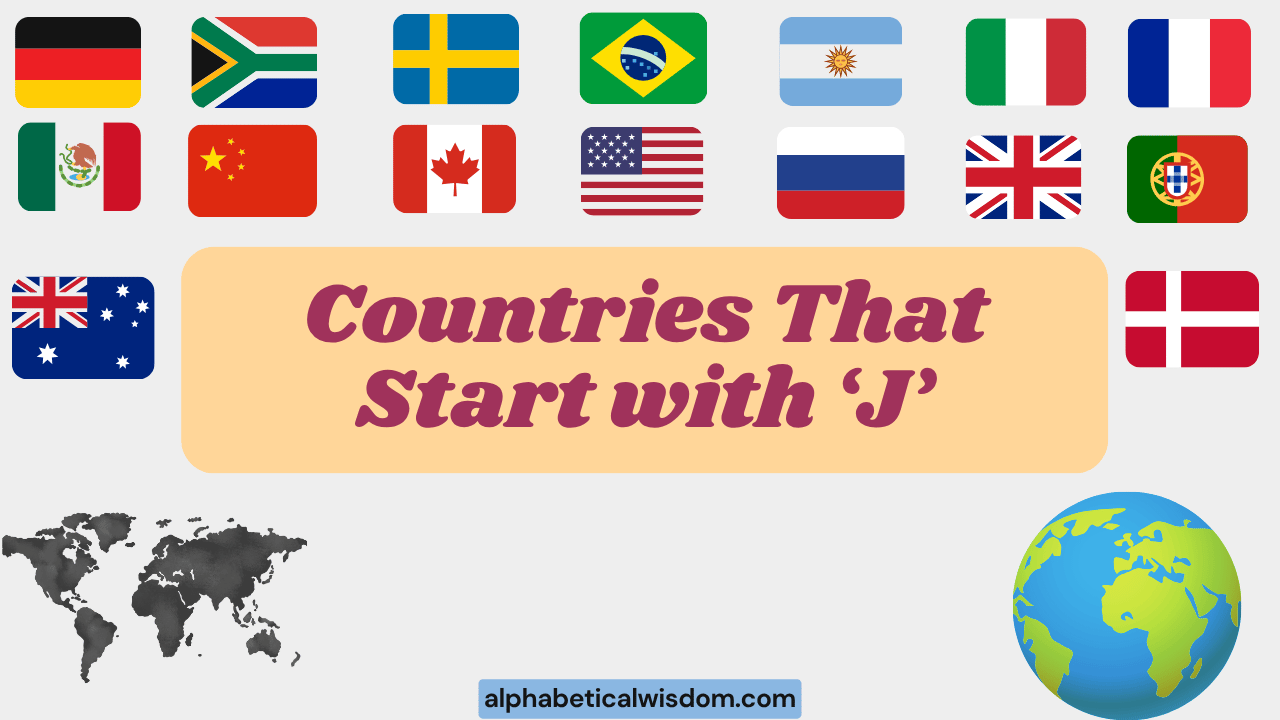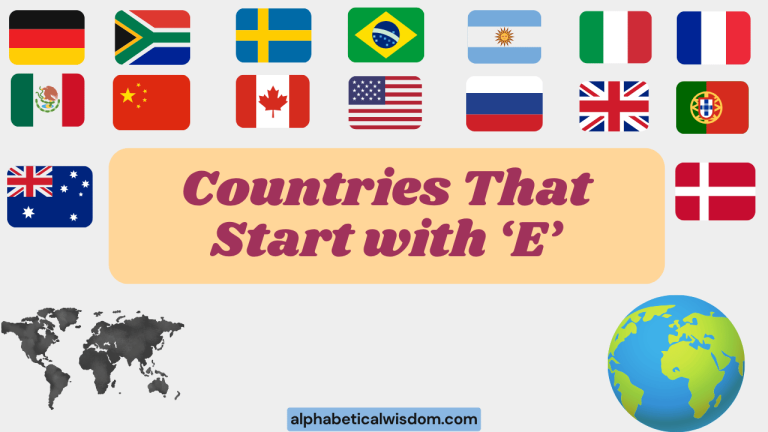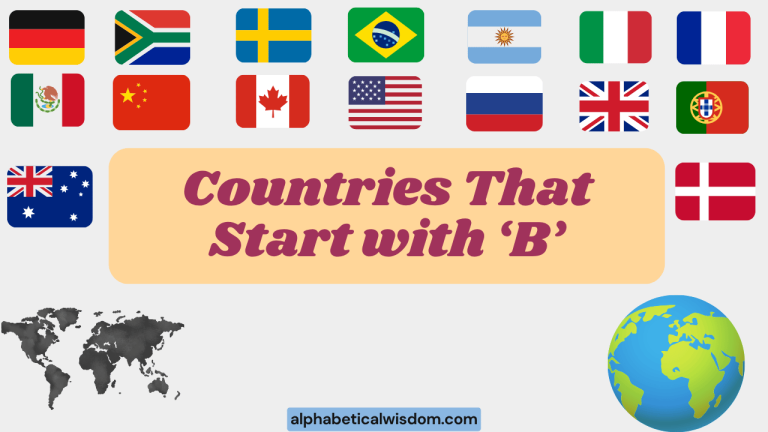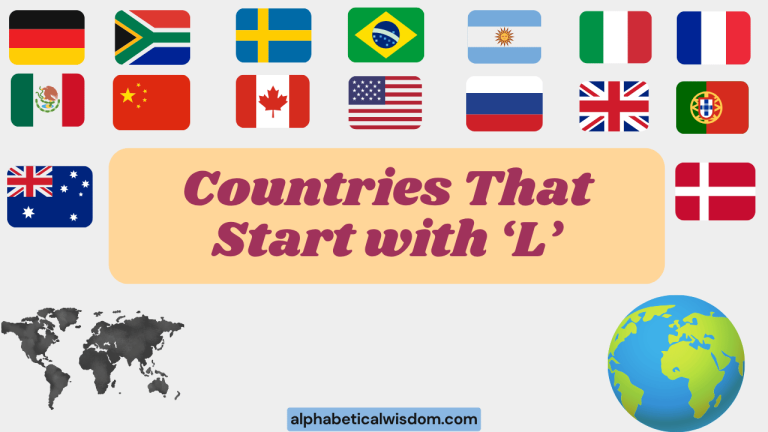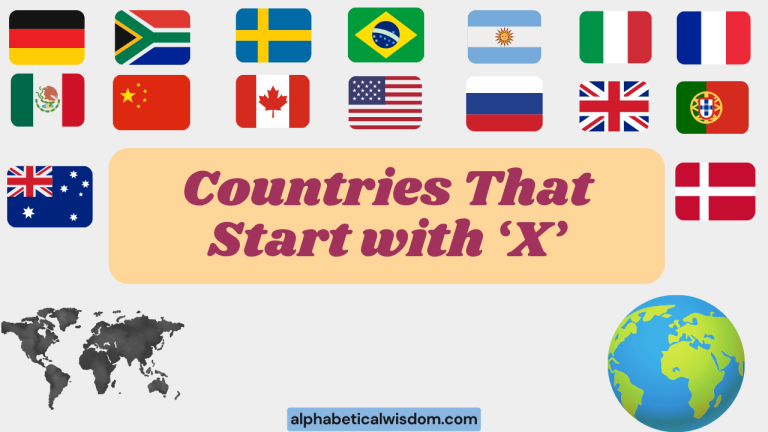Countries Starting With J: A Grammatical Exploration
Understanding how to correctly use country names, especially those starting with the letter “J,” is crucial for effective communication in English. This article provides a comprehensive guide to the grammatical considerations when referring to countries like Japan, Jordan, and Jamaica.
Mastering these rules will enhance your writing and speaking skills, ensuring clarity and accuracy. This guide is perfect for English language learners, students, educators, and anyone who wants to improve their grasp of English grammar and geography.
Table of Contents
- Introduction
- Definition: Countries Starting with ‘J’
- Structural Breakdown
- Types or Categories
- Examples
- Usage Rules
- Common Mistakes
- Practice Exercises
- Advanced Topics
- FAQ
- Conclusion
Definition: Countries Starting with ‘J’
A country is a defined geographic area with its own government, population, and sovereignty. When we talk about “countries starting with ‘J’,” we are referring to those independent nations whose names begin with the letter ‘J’ in the English language.
These countries, like any others, are proper nouns and require specific grammatical treatment in writing and speech. Understanding their correct usage is essential for clear and accurate communication.
The grammatical treatment of country names includes aspects such as capitalization, the use of articles (the), and the formation of adjectives and possessives. Proper usage ensures that your sentences are grammatically correct and contextually appropriate. Furthermore, understanding the nuances of how these names are used reflects a broader understanding of English language conventions.
Structural Breakdown
The structural breakdown involves understanding the components of a country’s name and how it functions within a sentence. Country names function primarily as proper nouns. Proper nouns always begin with a capital letter, regardless of their position in a sentence. They can act as subjects, objects, or complements within a sentence. Additionally, many countries have adjectival forms that are used to describe things related to that country (e.g., Japan becomes Japanese).
The use of articles (a, an, the) with country names is governed by specific rules. Most country names do not take an article. However, there are exceptions, especially when the name includes words like “Republic,” “Kingdom,” or “States.” For example, we say “Japan” but “the United States.” The absence or presence of an article can significantly affect the meaning and grammatical correctness of a sentence.
Types or Categories
Sovereign States
Sovereign states are independent and self-governing nations recognized by international law. They possess full control over their internal and external affairs.
Examples of sovereign states starting with ‘J’ include Japan, Jordan, and Jamaica. These countries have their own governments, laws, and international representation.
Dependent Territories
Dependent territories are regions that are governed by another country but are not fully integrated into it. They may have some degree of autonomy but ultimately remain under the control of the administering power.
While less common, it’s important to distinguish these from sovereign states. There are currently no widely recognized dependent territories that start with the letter ‘J’.
Examples
General Usage
This section provides examples of how country names starting with ‘J’ are used in various contexts. The examples illustrate the correct capitalization and the general function of these names within sentences.
Understanding these basic examples is crucial before moving on to more complex grammatical structures.
Here’s a table showing general usage examples:
| Country | Example Sentence |
|---|---|
| Japan | Japan is known for its advanced technology. |
| Jordan | Jordan is a country in the Middle East. |
| Jamaica | Jamaica is famous for its reggae music. |
| Japan | I plan to visit Japan next year. |
| Jordan | The capital of Jordan is Amman. |
| Jamaica | She traveled to Jamaica for a vacation. |
| Japan | Japan’s economy is one of the largest in the world. |
| Jordan | Jordan’s landscape is mostly desert. |
| Jamaica | Jamaica’s culture is vibrant and diverse. |
| Japan | He studied abroad in Japan. |
| Jordan | They explored the ancient ruins in Jordan. |
| Jamaica | We enjoyed the beaches in Jamaica. |
| Japan | Japan has a rich history. |
| Jordan | Jordan shares borders with several countries. |
| Jamaica | Jamaica gained independence in 1962. |
| Japan | The population of Japan is aging. |
| Jordan | The currency in Jordan is the Jordanian dinar. |
| Jamaica | The official language of Jamaica is English. |
| Japan | Japan is an archipelago. |
| Jordan | Jordan is a constitutional monarchy. |
| Jamaica | Jamaica is an island nation. |
| Japan | Many tourists visit Japan every year. |
| Jordan | The government of Jordan is stable. |
| Jamaica | The people of Jamaica are friendly. |
| Japan | I am learning about Japan in my geography class. |
| Jordan | My friend lived in Jordan for five years. |
| Jamaica | She returned from a business trip to Jamaica. |
Adjectival Forms
Adjectival forms are used to describe something that is related to a particular country. For example, “Japanese” is the adjectival form of “Japan.” These forms are essential for creating descriptive and nuanced sentences.
They modify nouns, providing more specific information about their origin or association.
Here’s a table illustrating adjectival forms:
| Country | Adjectival Form | Example Sentence |
|---|---|---|
| Japan | Japanese | She studies Japanese culture. |
| Jordan | Jordanian | He is a Jordanian citizen. |
| Jamaica | Jamaican | They enjoyed Jamaican cuisine. |
| Japan | Japanese | The Japanese economy is very strong. |
| Jordan | Jordanian | The Jordanian desert is beautiful. |
| Jamaica | Jamaican | Jamaican music is world-renowned. |
| Japan | Japanese | I bought a Japanese car. |
| Jordan | Jordanian | She wore a traditional Jordanian dress. |
| Jamaica | Jamaican | He spoke with a Jamaican accent. |
| Japan | Japanese | We visited a Japanese garden. |
| Jordan | Jordanian | The Jordanian government is working on reforms. |
| Jamaica | Jamaican | Jamaican athletes are very talented. |
| Japan | Japanese | He is fluent in the Japanese language. |
| Jordan | Jordanian | The Jordanian people are very hospitable. |
| Jamaica | Jamaican | She loves Jamaican coffee. |
| Japan | Japanese | The Japanese technology industry is innovative. |
| Jordan | Jordanian | The Jordanian currency is stable. |
| Jamaica | Jamaican | The Jamaican flag is very colorful. |
| Japan | Japanese | We ate at a Japanese restaurant. |
| Jordan | Jordanian | He studied Jordanian history. |
| Jamaica | Jamaican | She is interested in Jamaican culture. |
| Japan | Japanese | The Japanese education system is rigorous. |
| Jordan | Jordanian | The Jordanian economy is growing. |
| Jamaica | Jamaican | The Jamaican tourism industry is thriving. |
| Japan | Japanese | I admire the Japanese work ethic. |
| Jordan | Jordanian | She is a Jordanian doctor. |
| Jamaica | Jamaican | He is a Jamaican musician. |
In Sentences
This section provides a variety of sentences using the country names and their adjectival forms. These examples demonstrate how to incorporate these words into different sentence structures and grammatical contexts.
They also highlight the importance of using the correct form based on the intended meaning.
Below are sentences using countries starting with ‘J’:
| Sentence | Explanation |
|---|---|
| Japan is an island nation in East Asia. | Simple statement of fact. |
| The Jordanian government is investing in renewable energy. | Using the adjectival form “Jordanian.” |
| Jamaica’s beaches are a popular tourist destination. | Using the possessive form. |
| I want to learn more about Japanese history and culture. | Using the adjectival form “Japanese.” |
| He traveled from Jordan to visit his family. | Using a preposition to indicate movement. |
| She brought back Jamaican coffee as a souvenir. | Using the adjectival form “Jamaican.” |
| Japan’s technological advancements are impressive. | Using the possessive form. |
| The Jordanian desert is known for its stunning landscapes. | Using the adjectival form “Jordanian.” |
| Jamaica is famous for its reggae music and vibrant culture. | Describing Jamaica’s attributes. |
| My friend is studying Japanese at the university. | Using the adjectival form “Japanese.” |
| The Jordanian dinar is the official currency of Jordan. | Using the adjectival form “Jordanian.” |
| Jamaica gained its independence in 1962. | Stating a historical fact. |
| Japan’s population is aging rapidly. | Using the possessive form. |
| The Jordanian economy relies heavily on tourism. | Using the adjectival form “Jordanian.” |
| Jamaica’s national dish is ackee and saltfish. | Using the possessive form. |
| Japanese cuisine is known for its delicate flavors. | Using the adjectival form “Japanese.” |
| The Jordanian government is working to improve education. | Using the adjectival form “Jordanian.” |
| Jamaica’s athletes have excelled in track and field. | Using the possessive form. |
| Visiting Japan has always been a dream of mine. | Expressing a desire to visit. |
| The culture in Jordan is rich and diverse. | Describing the cultural aspects of Jordan. |
| I learned a lot about Jamaica in my history class. | Sharing information about what was learned. |
| Flying to Japan takes about 13 hours from here. | Providing travel information. |
| She is originally from Japan but now lives in the USA. | Indicating someone’s origin. |
| He is planning a trip to Jordan next summer. | Planning a future trip. |
Usage Rules
Capitalization
Country names, being proper nouns, always begin with a capital letter. This rule applies regardless of where the name appears in a sentence.
Correct capitalization is essential for clarity and grammatical accuracy. For example, “Japan,” “Jordan,” and “Jamaica” are always capitalized.
Articles (The vs. No Article)
Most country names do not require the definite article “the.” However, there are exceptions. Countries whose names include words like “States,” “Kingdom,” or “Republic” often take “the.” For example, we say “Japan” but “the United Kingdom.” Understanding these exceptions is crucial for correct usage.
In the case of countries starting with “J,” none typically require “the.”
Prepositions (In, To, From)
Prepositions are used to show the relationship between a noun or pronoun and other words in a sentence. When referring to countries, common prepositions include “in,” “to,” and “from.” For example: “She lives in Japan,” “He is traveling to Jordan,” and “They came from Jamaica.” The choice of preposition depends on the context and the intended meaning.
Possessive Forms
The possessive form of a country name indicates ownership or association. It is usually formed by adding an apostrophe and an “s” (‘s) to the country name.
For example, “Japan’s economy,” “Jordan’s landscape,” and “Jamaica’s culture.” This form is used to show that something belongs to or is associated with the particular country.
Common Mistakes
One common mistake is failing to capitalize the country name. Remember that country names are proper nouns and must always be capitalized.
Another frequent error is using the definite article “the” incorrectly. As a general rule, countries starting with “J” (Japan, Jordan, Jamaica) do not take “the.” For example, it is incorrect to say “the Japan.”
Another common error involves incorrect adjectival forms. Make sure to use the correct adjectival form when describing something related to the country.
For example, use “Japanese” to describe something from Japan, not “Japan.” Finally, be mindful of preposition usage. Using the wrong preposition can change the meaning of the sentence.
Here are some examples of common mistakes and their corrections:
| Incorrect | Correct | Explanation |
|---|---|---|
| i want to visit japan. | I want to visit Japan. | Capitalization of the country name. |
| the Japan is a beautiful country. | Japan is a beautiful country. | Incorrect use of the article “the.” |
| She likes Japan food. | She likes Japanese food. | Incorrect adjectival form. |
| He is going at Jordan. | He is going to Jordan. | Incorrect preposition. |
| Jordan’s climate is very dry. | Jordan’s climate is very dry. | Correct possessive form |
| He studies Jordan. | He studies Jordanian history. | Missing context and incorrect usage. |
| the Jamaica is an island. | Jamaica is an island. | Incorrect use of the article ‘the’. |
Practice Exercises
Exercise 1: Fill in the Blanks
Fill in the blanks with the correct country name (Japan, Jordan, or Jamaica) or its adjectival form.
| Question | Answer |
|---|---|
| 1. ________ is known for its reggae music. | Jamaica |
| 2. He is a ________ citizen. | Jordanian |
| 3. She studies ________ culture. | Japanese |
| 4. The capital of ________ is Amman. | Jordan |
| 5. ________’s economy is one of the largest in the world. | Japan |
| 6. I want to visit ________ next year. | Japan |
| 7. ________ is an island nation. | Jamaica |
| 8. He enjoys ________ cuisine. | Jamaican |
| 9. ________ is located in the Middle East. | Jordan |
| 10. The ________ language is complex. | Japanese |
Exercise 2: Correct the Errors
Identify and correct the errors in the following sentences.
| Incorrect Sentence | Correct Sentence |
|---|---|
| 1. the Japan is a beautiful country. | Japan is a beautiful country. |
| 2. She is from jordan. | She is from Jordan. |
| 3. He likes jamaica music. | He likes Jamaican music. |
| 4. They are traveling to the jordan. | They are traveling to Jordan. |
| 5. japan’s climate is temperate. | Japan’s climate is temperate. |
| 6. I am learning about japan in school. | I am learning about Japan in school. |
| 7. the jamaica is known for its beaches. | Jamaica is known for its beaches. |
| 8. Jordanian food is very delicious. | Jordanian food is very delicious. |
| 9. going to japan is my dream. | Going to Japan is my dream. |
| 10. she bought a japanese car. | She bought a Japanese car. |
Exercise 3: Sentence Construction
Construct sentences using the given words related to countries starting with “J.”
| Words | Example Sentence |
|---|---|
| 1. Japan, technology, advanced | Japan is known for its advanced technology. |
| 2. Jordan, desert, landscape | The Jordanian desert has a stunning landscape. |
| 3. Jamaica, reggae, music | Jamaica is famous for its reggae music. |
| 4. Japanese, culture, fascinating | Japanese culture is fascinating to study. |
| 5. Jordanian, history, ancient | Jordanian history is filled with ancient civilizations. |
| 6. Jamaica, beaches, beautiful | Jamaica has many beautiful beaches. |
| 7. Japan, visit, want | I want to visit Japan someday. |
| 8. Jordan, explore, ruins | We plan to explore the ruins in Jordan. |
| 9. Jamaica, enjoy, vacation | They enjoyed their vacation in Jamaica. |
| 10. Japanese, food, love | I love Japanese food, especially sushi. |
Advanced Topics
Historical Contexts
Understanding the historical contexts of countries starting with “J” can provide deeper insights into their cultures and languages. For example, Japan has a rich history of feudalism and imperial rule, which has significantly shaped its modern society.
Jordan has played a crucial role in Middle Eastern politics, and its history is intertwined with the Arab-Israeli conflict. Jamaica’s history is marked by its colonial past and the transatlantic slave trade, which have profoundly influenced its cultural identity.
Exploring these historical contexts can enrich your understanding of the nuances of the English language used when referring to these countries. It also allows for a more informed and sensitive approach to communication.
Cultural Nuances
Cultural nuances play a significant role in how we use language to describe and refer to countries. Understanding these nuances can help avoid misunderstandings and promote respectful communication.
For example, in Japan, formality and politeness are highly valued in language. In Jordan, hospitality and respect for elders are important cultural values.
In Jamaica, the use of patois (a local dialect) is common and reflects a strong sense of cultural identity.
Being aware of these cultural nuances can greatly enhance your ability to communicate effectively and appropriately when discussing these countries and their people.
FAQ
- Why is it important to capitalize country names?
Country names are proper nouns, and proper nouns are always capitalized in English. This distinguishes them from common nouns and ensures clarity in writing.
- Do all country names require the article “the”?
No, most country names do not require “the.” However, some exceptions exist, such as “the United States” or “the United Kingdom,” where the name includes words like “States,” “Kingdom,” or “Republic.”
- What is the adjectival form of a country name?
The adjectival form is used to describe something related to that country. For example, “Japanese” is the adjectival form of “Japan,” and it is used to describe things like Japanese culture or Japanese food.
- How do I form the possessive of a country name?
The possessive form is usually formed by adding an apostrophe and an “s” (‘s) to the country name. For example, “Japan’s economy” or “Jamaica’s beaches.”
- What are some common prepositions used with country names?
Common prepositions include “in,” “to,” and “from.” For example, “She lives in Japan,” “He is traveling to Jordan,” and “They came from Jamaica.”
- Why is it important to use the correct adjectival form?
Using the correct adjectival form ensures that your sentences are grammatically correct and that you are accurately describing the relationship between the country and the noun you are modifying.
- Are there any exceptions to the capitalization rule for country names?
No, country names should always be capitalized, regardless of their position in a sentence.
- How can I improve my understanding of the usage of country names in English?
Read widely, pay attention to how native speakers use country names, and practice writing and speaking using these names in various contexts. Also, consult grammar resources and seek feedback from teachers or language partners.
- Is it ever acceptable to use a shortened version of a country’s name?
Sometimes, shortened versions are used informally, but it’s generally best to use the full name in formal writing or when clarity is important. For example, using “UK” instead of “United Kingdom” is common but may not be appropriate in all contexts.
Conclusion
Mastering the grammatical rules for countries starting with the letter “J” is essential for clear and accurate communication in English. This article has covered the key aspects, including capitalization, article usage, adjectival forms, and common mistakes.
By understanding these rules and practicing regularly, you can significantly improve your English language skills. Remember to pay attention to context and cultural nuances to ensure your communication is both grammatically correct and culturally sensitive.
Keep practicing and you will become more confident and proficient in your use of English.
